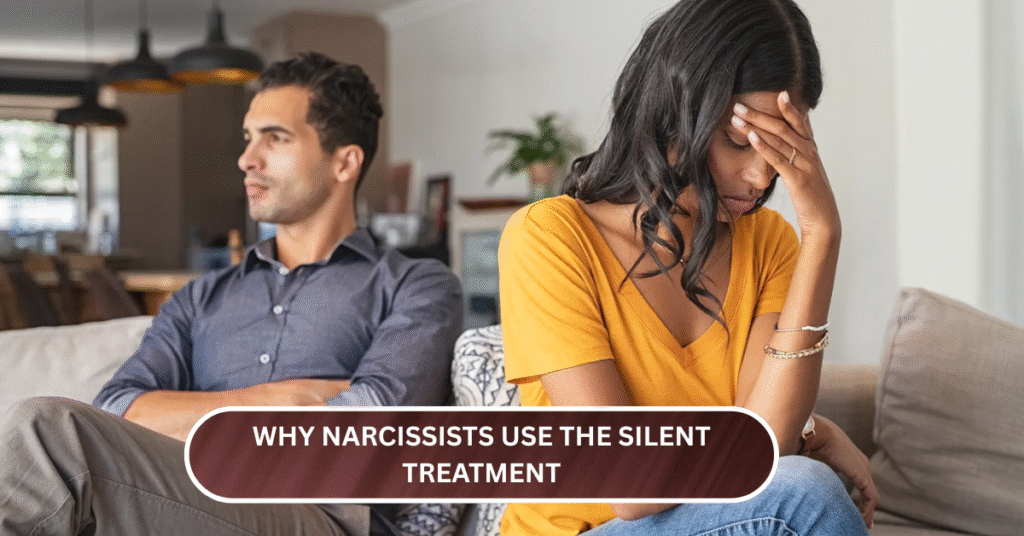
The silent treatment is a common tactic used by narcissists to control and punish others. It feels confusing and hurtful when someone suddenly stops talking to you without explanation. Many people do not understand why it happens or how to deal with it in a healthy way. This article will help you recognize the silent treatment as emotional punishment and give you practical advice on setting boundaries and responding calmly.
Understanding the silent treatment is important, especially for young adults navigating complicated relationships. A narcissist’s silence is not about solving problems; it is a way to make you feel ignored and powerless. By learning why they use this tactic and how to respond, you can protect your peace of mind and build stronger emotional boundaries.
What is the Silent Treatment?
This Article Includes
- 1 What is the Silent Treatment?
- 2 Why Do Narcissists Use the Silent Treatment?
- 3 How Does the Silent Treatment Affect You?
- 4 Setting Healthy Boundaries Against the Silent Treatment
- 5 How to Respond When the Silent Treatment Happens
- 6 Why It’s Important to Recognize Emotional Punishment
- 7 Conclusion: Taking Care of Yourself
The silent treatment is when someone deliberately stops talking or responding to you. It is a form of emotional punishment where the person ignores you to show anger, control, or punish you for something you did. For narcissists, it is a tool to gain power over others and avoid responsibility. Instead of discussing issues openly, they use silence to make you feel confused and guilty.
Why Do Narcissists Use the Silent Treatment?
Narcissists want to feel superior and in control at all times. When they face criticism or feel challenged, they may use the silent treatment as a weapon. It helps them avoid admitting mistakes or showing vulnerability. They believe that by withholding communication, they can punish you and make you chase after their approval.
This behavior is not about solving conflicts but about control. Narcissists often lack empathy, so they don’t consider how their silence hurts others. Instead, they focus on making you feel uncertain and anxious, giving them a sense of power.
How Does the Silent Treatment Affect You?
The silent treatment can be very painful. It creates a feeling of being rejected or unimportant. You may start doubting yourself, wondering what you did wrong. This emotional punishment can lower your self-esteem and make you feel isolated. It can also increase stress and anxiety, especially if you don’t understand why the silence is happening.
Because the narcissist won’t communicate openly, it is hard to resolve issues. This leaves you stuck in confusion and emotional pain. Recognizing the silent treatment as a harmful behavior is the first step in protecting yourself from its effects.
Setting Healthy Boundaries Against the Silent Treatment
Dealing with a narcissist’s silent treatment can be challenging, but setting clear boundaries helps you stay strong. First, understand that you don’t deserve to be punished by silence. You have the right to express your feelings and ask for respect.
One healthy boundary is to calmly state that you will not tolerate being ignored as a way to punish you. You can say something like, “I want to talk when you’re ready, but I won’t accept silence to avoid problems.” This shows you want to communicate but won’t accept emotional games.
How to Respond When the Silent Treatment Happens
When a narcissist uses the silent treatment, don’t fall into their trap by trying to force a response or begging for attention. This only gives them more control. Instead, focus on yourself and your well-being.
Try these response tactics:
- Stay calm and patient. Don’t react with anger or sadness.
- Use “I” statements if you decide to reach out, like “I feel upset when we don’t talk.”
- Limit your communication to necessary topics only.
- Give them space but do not wait forever. Set a time limit on how long you will tolerate silence.
- Seek support from friends, family, or a counselor to stay emotionally balanced.
Remember, it’s okay to walk away if the silent treatment becomes a regular way to control you. Protecting your mental health is more important than winning or fixing the narcissist’s behaviour.
Why It’s Important to Recognize Emotional Punishment
The silent treatment is a form of emotional punishment that can damage your mental health over time. Recognizing it helps you avoid blaming yourself or feeling powerless. It’s not your fault that someone chooses to ignore you as a weapon.
When you understand this, you can stop taking the silence personally and focus on what you can control — your reactions and boundaries. This is a key step in breaking free from harmful emotional patterns and building healthier relationships.
Conclusion: Taking Care of Yourself
Narcissists use the silent treatment to control and punish, but you don’t have to suffer in silence. By understanding their motives, setting clear boundaries, and responding calmly, you protect your emotional health. Remember to prioritize your well-being and seek support when needed.
Healthy communication and respect are the foundations of any good relationship. You deserve to be treated with kindness, not silence as punishment. Stay strong, know your worth, and don’t let silence steal your peace of mind.


